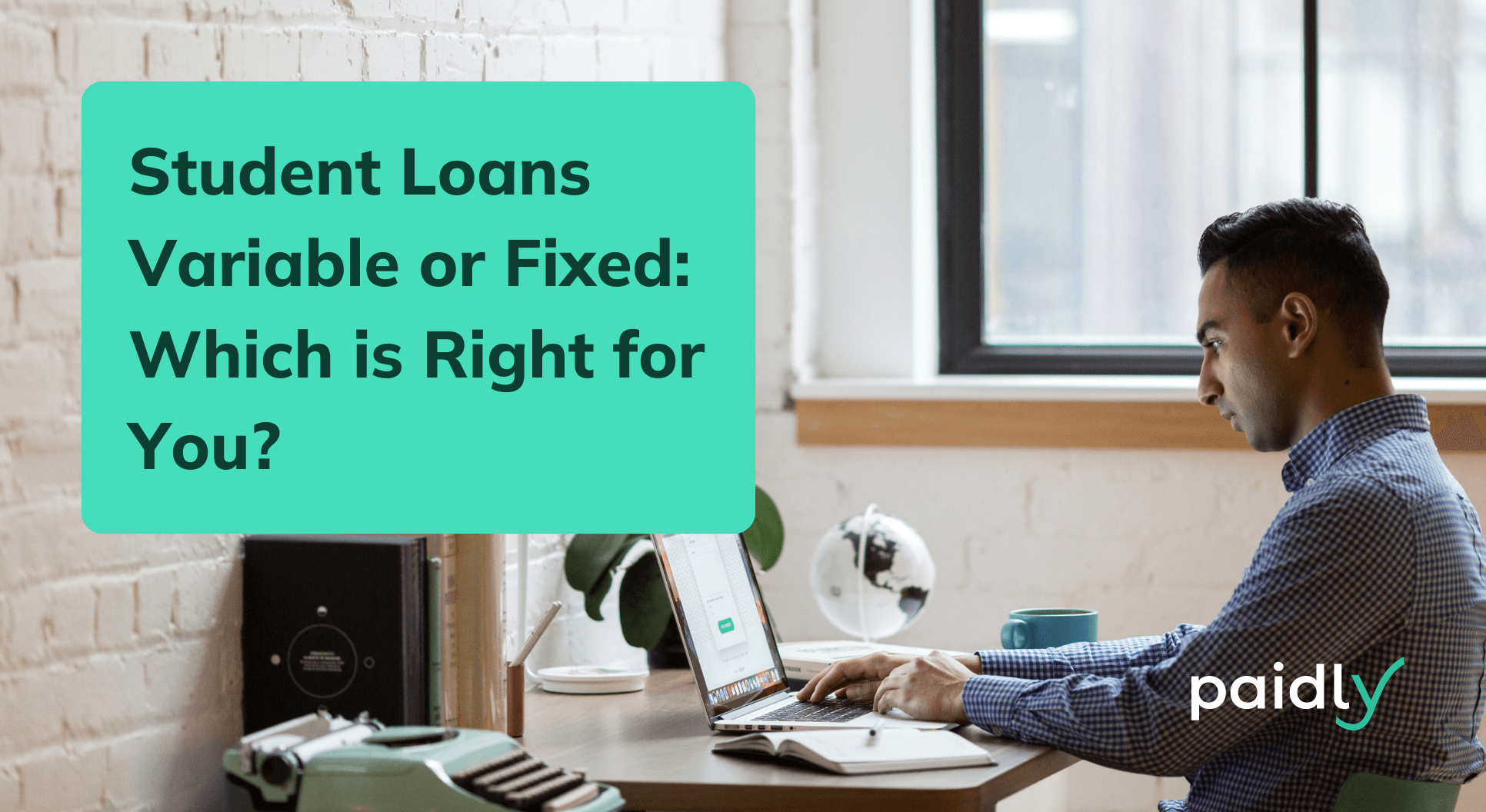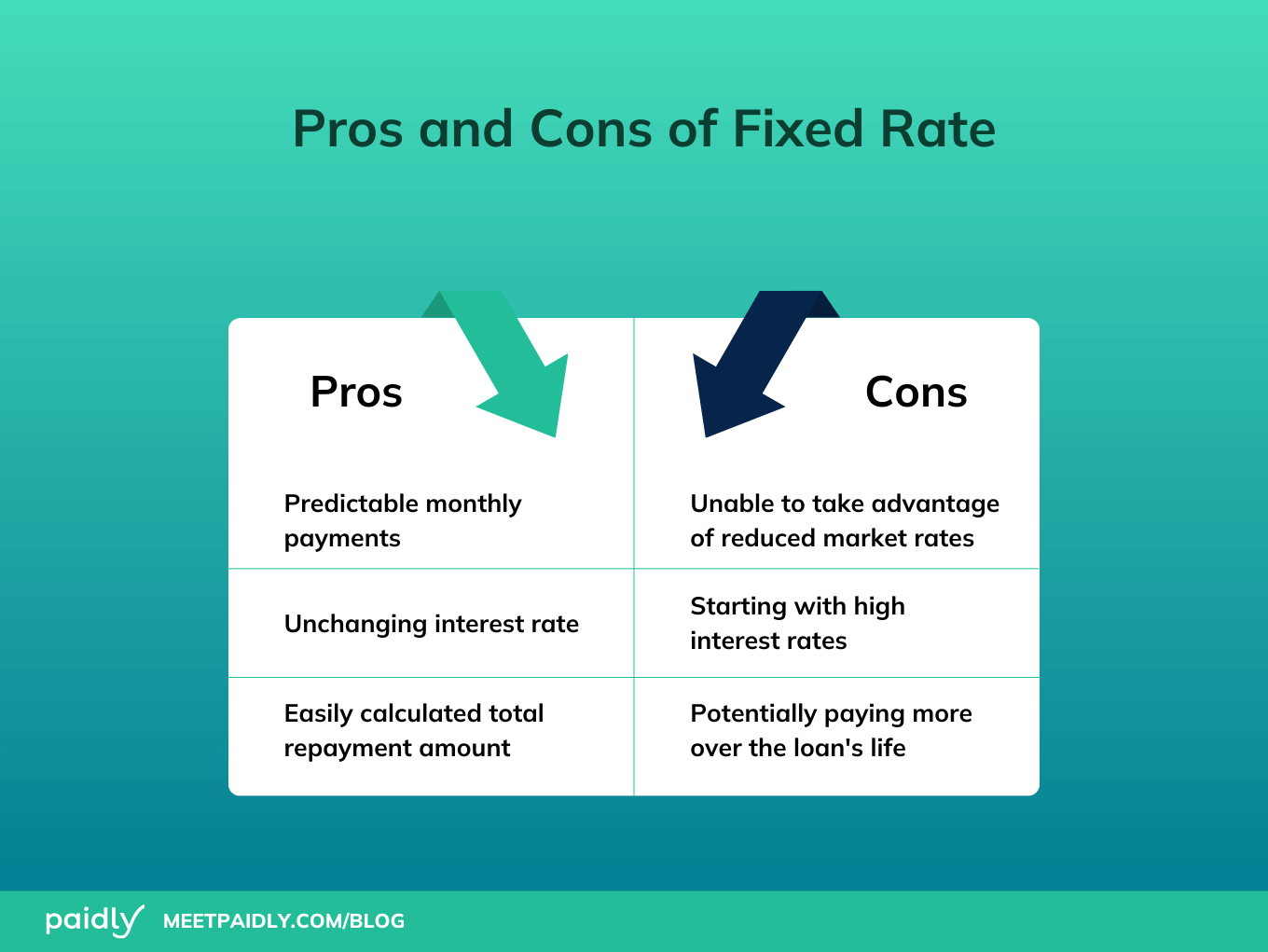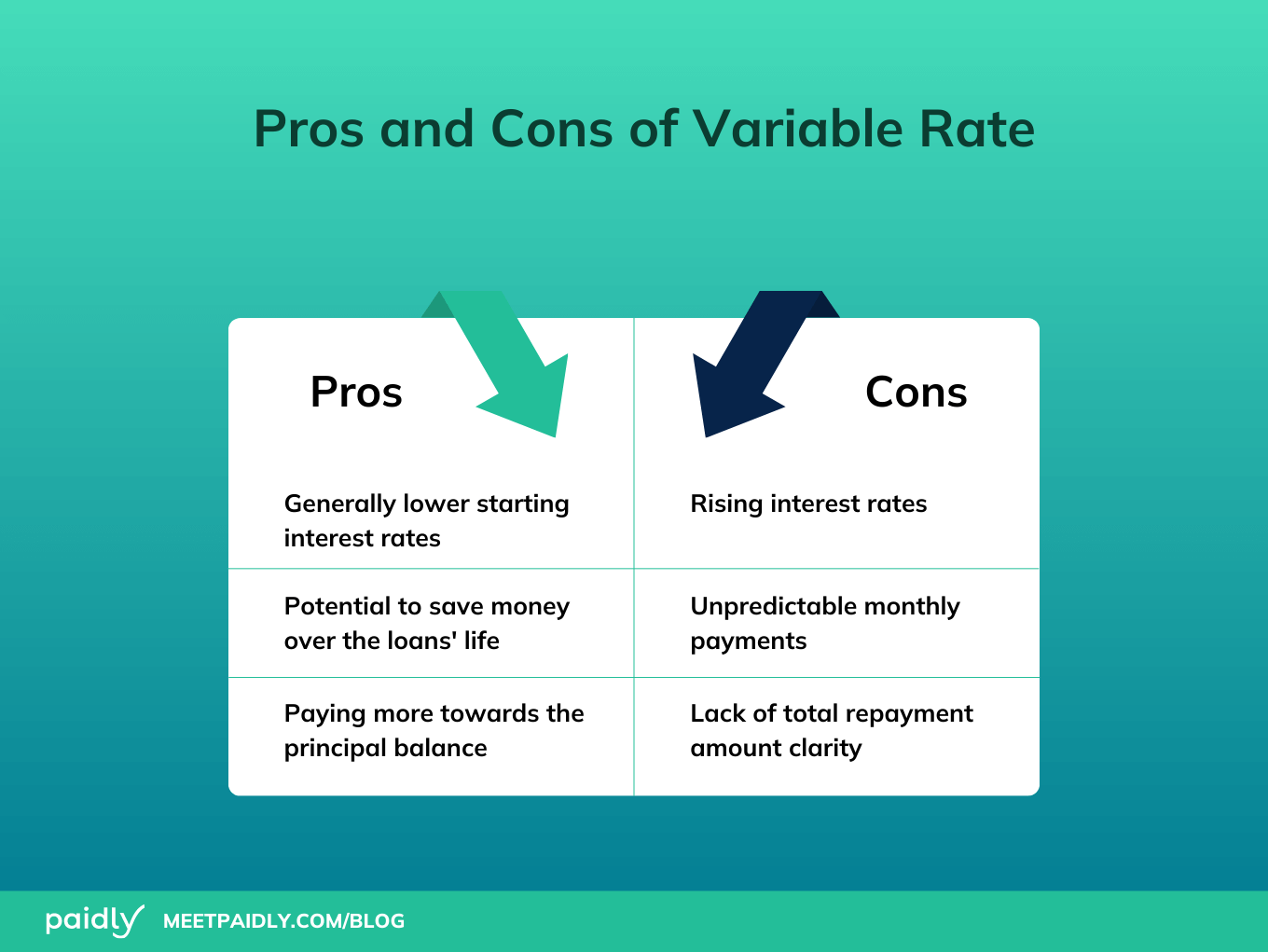Student Loan Variable or Fixed: Which is Right for You?
Deciding between a variable or fixed student loan rate might feel like a gamble, but don't worry! We are here to help you make an informed choice that suits your needs and financial goals.

Key Takeaways
- Whether a student loan is variable or fixed can greatly impact the repayment journey.
- Fixed rates offer stability in monthly payments.
- Variable rates can offer lower initial payments but come with unpredictability.
- Use Student Loan Repayment Benefits through Paidly to supplement your choice
Fixed-Rate Student Loans: Steady and Stable
What Are Fixed-Rate Student Loans?
Fixed-rate student loans maintain a consistent interest rate, ensuring minimum monthly payments remain the same over the loan's life. As a general rule, borrowers prefer fixed-rate loans for their reliability and rate insurance over long-term loans.
Pros of Fixed-Rate Loans
- Predictable monthly payments
- Unchanging interest rate
- Easily calculated total repayment amount
Cons of Fixed-Rate Loans
- Unable to take advantage of reduced market rates
- Starting with higher interest rates
- Potentially paying more over the loan's life

Variable-Rate Student Loans: A Dynamic Option
What Are Variable-Rate Student Loans?
Variable-rate student loans have interest rates that fluctuate over time, typically based on market conditions and economic factors. Initial payments may start lower than with fixed rates, but keep in mind that these can change. If you're a risk-taker who's optimistic about future market trends, this option might be more in line with your financial ethos.
Pros of Variable-Rate Loans
- Generally lower starting interest rates
- Potential to save money over the loan's life
- Paying more towards the principal balance
Cons of Variable-Rate Loans
- Rising interest rates
- Unpredictable monthly payments
- Lack of total repayment amount clarity

Who benefits from Fixed-Rate Student Loans?
For those who value consistency, fixed-rate student loans can offer considerable benefits. These loans provide predictable, consistent payment plans, much like a well-balanced meal delivers a variety of essential nutrients. You'll enjoy fewer surprises from shifting market rates and manageable, identical payments each time.
Consider Kim's recent graduation situation. Having secured a steady job, she's now focused on careful budgeting and maintaining control over her finances. Opting for a fixed-rate loan, Kim can confidently plan her monthly expenses, knowing that her student loan payment will remain consistent. It's as reassuring as her favorite playlist – familiar and steady, with no unexpected twists.
In conclusion, embracing stability and a strategic approach to financial planning can make fixed-rate student loans an optimal choice. These loans empower you to plan your financial journey with certainty and confidence. Remember, the path to financial freedom isn't about finding a prize at the end of the rainbow – it's built on informed decisions that set the course for lasting success.
Who Benefits from Variable-Rate Student Loans?
The young and adventurous might find variable-rate student loans appealing. If you expect your income to rise or can pay off the loan quickly, taking a gamble on a variable rate could save you significant bucks.
Switching Between Fixed and Variable Rates
Can You Switch Between Loan Types?
Switching between fixed and variable rates is possible with some lenders, including Earnest, They make it easy without fees, but credit checks are required. Expect new interest rates based on prevailing loan rates and financial profiles.
Options for Federal Student Loans
Federal student loans have fixed interest rates throughout the loan term. Refinancing with another provider is possible for private student loans. A better credit score or a cosigner can help secure lower rates.
Choosing Between Fixed or Variable Student Loans
Fixed-rate student loans offer peace of mind in the form of unwavering, predictable payments. On the other hand, variable-rate loans come with the potential for lower initial rates and faster repayment, but they might be more uncertain. Here are some factors to consider:
- Type of loan: Federal loans have fixed interest rates, while private loans often offer both fixed and variable options.
- Repayment timeline: Longer repayment periods mean more time for variable rates to fluctuate, so keep your intended repayment duration in mind.
- Market conditions: If rates are rising or falling, it could impact what you end up paying.
- Risk tolerance: Are you comfortable with the uncertainty of fluctuating payments?
Opt for Variable-Rate Loans If:
- You desire lower initial payments
- You plan on quick loan repayment
- You plan to refinance when interest rates are lower
Opt for Fixed-Rate Loans If:
- You prefer predictable payments
- You desire a locked-in interest rate
- You want to know the exact total you’ll pay on your loan
Selecting the Perfect Student Loan
Deciding between fixed or variable student loans is a critical choice dependent on individual needs and financial circumstances. Analyze factors such as repayment plans, financial stability, and risk tolerance before settling on the ideal option. Fixed-rate loans offer steady payments, ideal for those who value predictability. while variable-rate loans are alluring for those targeting lower initial rates and who plan to pay off loans promptly. Always ensure your decision aligns with your financial goals and strategy.
Use Student Loan Repayment Benefits to supplement your choice
No matter which option you choose, repayment can be made easier through Paidly! Our platform helps employers offer Student Loan Repayment as an employee Benefit. Employers can contribute tax-exempt up to $5,250 per year to employees' student loans, providing welcome relief for both fixed and variable student loan borrowers.
Team Paidly
Paidly is a Student Loan Repayment Benefit platform. Leveraging over a decade and a half of Fintech, student loan origination, and refinancing experience. Paidly specializes in creating custom student loan repayment benefit plans, designed specifically to allow employers to pay directly towards their employees' student loans. Paidly's system requires no integration and enhances talent attraction and employee retention.
Join our newsletter
Don't miss any more news and subscribe to our newsletter today.
The information provided is of a general nature and an educational resource. It is not intended to provide advice or address the situation of any particular individual or entity. Any recipient shall be responsible for the use to which it puts this document. Paidly shall have no liability for the information provided. While care has been taken to produce this document, Paidly does not warrant, represent or guarantee the completeness, accuracy, adequacy, or fitness with respect to the information contained in this document. The information provided does not reflect new circumstances, or additional regulatory and legal changes. The issues addressed may have legal, financial, and health implications, and we recommend you speak to your legal, financial, and health advisors before acting on any of the information provided.
You may also like

A Meaningful Gift for the Ones Who Matter Most
Gifting financial freedom is more than a gesture - it’s an investment in those you care about. Help your loved ones thrive by supporting their education this holiday season.

The Gift That Keeps On Giving: 529 Year-End Bonuses
Spread your year-end bonus further this season by paying directly toward employees’ 529 educational savings plans.

Why You’ll Want to Put Year-End Bonuses Toward Student Loans
Putting employee year-end bonuses directly toward student loans is the perfect way to strengthen your workforce this holiday season.
